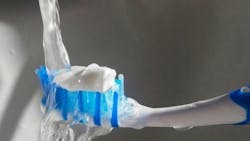In brief: New poll shows support for fluoridation, TEETH Act lauded by ADA
Americans continue to support fluoridation
New data from a recent poll by the CareQuest Institute for Oral Health reveals an overwhelming majority of Americans either support or are not opposed to water fluoridation.1
Out of the 1,114 participants surveyed, only 6% were in favor of banning fluoride from drinking water, with 52% actively supporting fluoridation and 29% unopposed. This data clashes with the Trump administration's recent push to eliminate fluoride from the country's drinking water.1
According to Melissa Burroughs, senior director of public policy at CareQuest, "This survey confirms that the campaign against water fluoridation is out of step with not only the vast majority of the scientific and medical communities, but with the American people, too. The government should protect oral health, not cut off access to basic preventive care like fluoride."1
Furthermore, 96% of respondents trust their family health provider to educate them on fluoridation and 79% believe the US government should do everything in its power to protect and improve oral health. Removing fluoride from drinking water has the potential to worsen the nation's oral health, amassing a projected 25 million additional decayed teeth and nearly $10 billion in health-care costs.1
You can read the full results of this study from the CareQuest Institute for Oral Health.
Introducing the TEETH Act
The American Dental Association (ADA) recently commended a new piece of legislature committed to supporting oral health through evidence-based scientific research. The TEETH Act (which stands for Protect Our Treatment for Enamel, Erosion, and Tooth Health) was recently introduced by several state representatives. According to a press release from the ADA, it is designed to "advance gold standards in future studies on water fluoridation and encourage states to use current, peer reviewed information to make the best health policy decisions in their state."2
Community water fluoridation has been around for 80 years and has shown to be effective and safe in preventing tooth decay-particularly for those who don't have access to dental care. With this in mind, the TEETH Act can use scientific data to debunk misinformation about fluoride and help states and municipalities implement safe fluoridation programs for their communities.2
About the TEETH Act, ADA president Brett Kessler said, "Recently, there has been a growing distrust of credible, time-tested, evidence-based science about the safety and need for water fluoridation programs. Now is the time to officially combat this misinformation with the assistance of the National Academies of Sciences, Engineering, and Medicine (NASEM) to offer independent and objective advice on the actual evidence of fluoride safety and dispel myths that have gained recent popularity without merit."2
Learn more about the goals and objectives of the TEETH Act on the ADA's website.
References
-
Community water fluoridation national opinion poll results. CareQuest Institute for Oral Health. July 16, 2025. https://www.carequest.org/resource-library/community-water-fluoridation-national-opinion-poll-results
-
TEETH Act puts bite back into evidence-based science. American Dental Association. July 21, 2025. https://www.ada.org/about/press-releases/teeth-act-puts-bite-back-into-evidence-based-science
About the Author

Sarah Butkovic, MA, BA
Sarah Butkovic, MA, BA, is an Associate Editor at Endeavor Business Media, where she works on creating and editing engaging and informative content for today's leading online dentistry publications. She holds a Master's English Language and Literature from Loyola University Chicago and is passionate about producing high-quality content that educates, inspires, and connects with readers.

